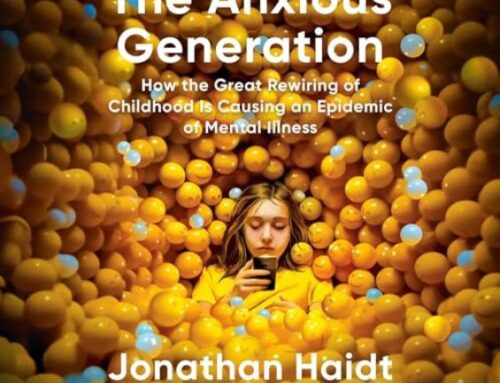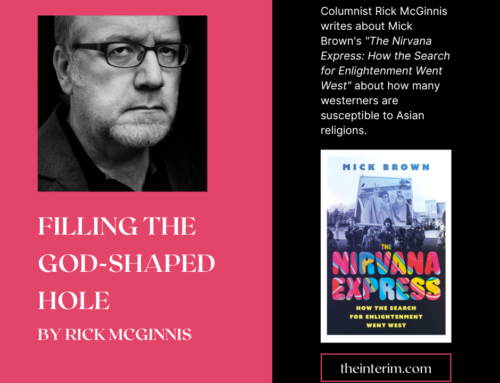 There’s a scene early on in The September Issue, a recent documentary about Vogue magazine’s doorstopper-sized fall edition, which must have made the filmmakers gasp when they knew they had it captured. At Paris fashion week, an unnamed but very chic-looking woman stage-whispers in French into the ear of a highly improbable man named Andre Leon Talley that “Anna is the most powerful woman in the United States.” The Anna in question – Vogue US editor Anna Wintour – is sitting next to Talley and has obviously heard this, and responds with a look that would probably be considered overacting were Meryl Streep to attempt it in a feature movie.
There’s a scene early on in The September Issue, a recent documentary about Vogue magazine’s doorstopper-sized fall edition, which must have made the filmmakers gasp when they knew they had it captured. At Paris fashion week, an unnamed but very chic-looking woman stage-whispers in French into the ear of a highly improbable man named Andre Leon Talley that “Anna is the most powerful woman in the United States.” The Anna in question – Vogue US editor Anna Wintour – is sitting next to Talley and has obviously heard this, and responds with a look that would probably be considered overacting were Meryl Streep to attempt it in a feature movie.
Streep has, in fact, already played a character explicitly modeled on Wintour in the 2006 movie The Devil Wears Prada, and since The September Issue was released three years after the Streep film, it’s to be assumed that anyone eager to sit through a feature documentary about Vogue and Wintour will already be apprised of her reputation. The title of the Streep film infers that there’s something Mephistophelian about Wintour, and that a Faustian bargain is a tacit condition of working in her employ.
It’s a bit of common wisdom underlined by the fact that the novel that the film is based upon was written by a former assistant of Wintour’s. That might be a bit hyperbolic, though Wintour’s gamut of expression, framed under her trademark bob by The September Issue’s cameras, is more in the range of “evil stepmother.”
It’s easy to laugh at fashion, especially if you’re one of the poor beknighted souls who live far outside its orbit, and who might, if pressed, be able to name at least a handful of women more powerful than Wintour. Wintour’s own college-age daughter, shown occasionally under her mother’s anxious eye, could probably name them easily – she’s interning in a judge’s office and wants to attend law school, and persistently rebuts her mother’s desire that she follow in her footsteps, explaining with a laugh that she simply can’t take fashion seriously.
It’s a world that parodies itself effortlessly. One of the many stories glimpsed in Vogue’s September issue is the retirement of Valentino, one of the last great couture designers, a swansong that was the subject of another documentary released last year – Matt Tyrnauer’s Valentino: The Last Emperor. The title is grandiose – almost laughably so – but Tyrnauer is intent on mining it for all the majesty it can offer, even if his subject is a brittle and mercurial older gentleman who travels with a retinue of five pug dogs.
Valentino’s last collection and his exit from the fashion world is painstakingly stage-managed, right down to a museum showcase of his work that feels like a living wake, and Tyrnauer’s camera follows him from city to city on his private jet, through vast palatial rooms and an endless succession of celebrity cameos, with brief stops at his alpine ski retreat and his monstrous motor yacht as it sails the Mediterranean. It’s hard to avoid the revelation that fashion designers are the only people in the real world who live like Bond villains.
It’s a sad truth that documentaries don’t have the same power and dignity that they once did in this age of Michael Moore and a film genre that’s devolved into either film polemics or reality television, but even if fashion’s gilded excess seems silly to you, it’s hard not to be drawn into either of these films, especially for the glimpses of actual humanity, corseted and over-groomed as it might be.
Most affecting of all is a moment, late in The September Issue, after we’ve already absorbed Anna Wintour’s obvious hurt at her daughter’s inability to approve of what she does by accepting it as a legacy. Wintour talks about her siblings, all of whom are seriously involved in liberal British politics – one brother is the political editor of the Guardian newspaper. “I think they’re very amused by what I do,” she says, repeating the word “amused” again to let us know that, in that context of Britain and class, there’s not a lot of humour or levity in that state of amusement. For a moment, you can’t help but feel pity for this particular devil.




